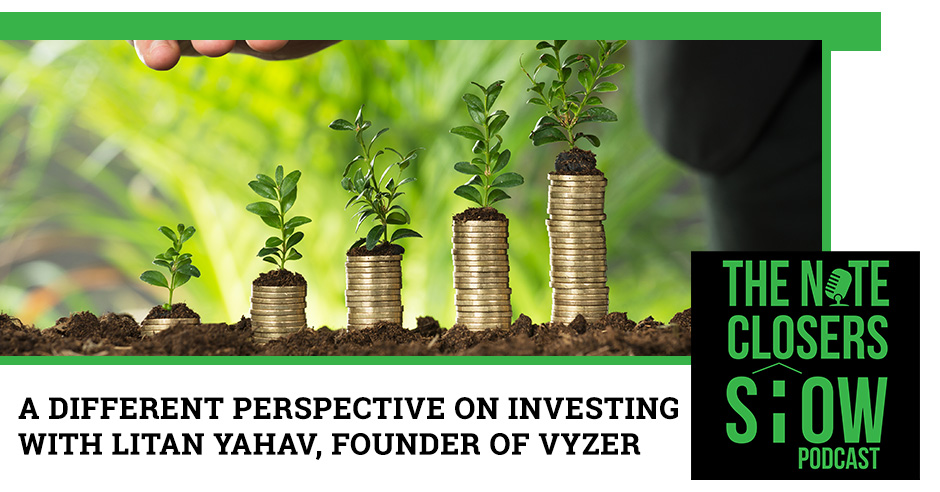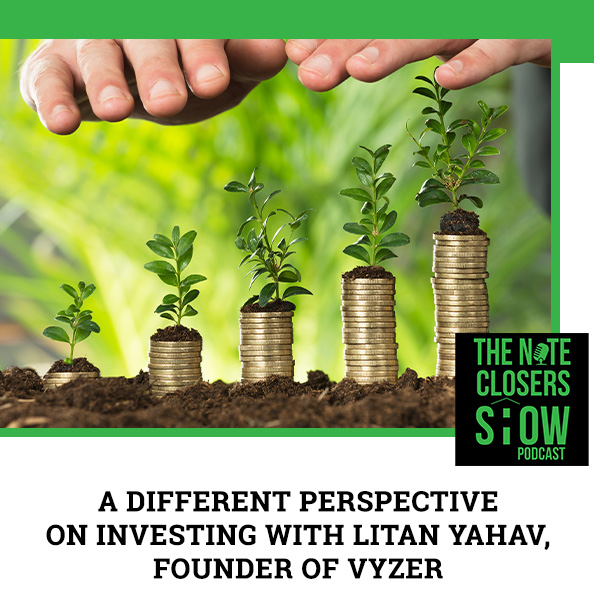
There are a lot of different perspectives on investing, and it matters how you do it, what you do, and why. In this episode, Scott Carson interviews the founder of Vyzer, Litan Yahav, about what inspired the company’s founding, his passion for passive and active real estate investing, disrupting the world diamond exchange, and what makes for a good passive investment to invest in. Litan excels in his field because he finds solutions for real problems that he, as an investor, goes through. Learn how to elevate and diversify your investments through tools like Vyzer and get more financial tips and insights from Litan by tuning in.
Want to talk to Scott? Book a call with him HERE (link “HERE” to http://TalkWithScottCarson.com).
—
Watch the episode here
Listen to the podcast here
A Different Perspective On Investing With Litan Yahav, Founder Of Vyzer
This is Litan Yahav, the Cofounder and CEO at Vyzer. I’m here to talk with Scott about investing in diamonds, selling a business, investing in real estate private equity and then building a new startup around that. I had an amazing conversation. I hope you love it as well.
—
We’ve got a very special guest. This guy is an entrepreneur with a passion for working with investors but he’s built a tech company that’s helping so many investors out there. I know we got so many real estate investors but many of you in our Note Nation not only invest in real estate but you’ve also got your portfolio stocks and other things you’re doing. I’m excited to have our special guest here.
This guy is a former Navy officer in the Israeli Navy. He revolutionized a diamond display company and the technology disrupted the whole global diamond. With that, he became an active and passive real estate investor. He’s out of Israel, which most of us don’t know, our third biggest audience besides the United States and Canada. We get a lot of Jewish folks who invest in the United States and read the show. We’re honored to have Litan Yahav join us here. He is the CEO and Founder of Vyzer.
—
Welcome to the show, Litan.
I appreciate you. Thank you for having me on the show.
It’s good to be excited about something here. I have to ask you, how do you get into disrupting the diamond world? That doesn’t something you hear about taking place. When you put that talk about your bio, isn’t that a closely guarded industry where you got to know and be in the know in that industry to do anything or not? How’s that work?
You have no idea. It’s such a crazy industry. A little background on that. After the military, I went to travel the world a little bit and then went to school. During my last year of study, there is this entrepreneurship program where a group of people needs to think about an idea, build a team around it and build a startup throughout their studies. A friend of a friend took us around to a diamond exchange. I don’t know if anyone knows but Israel is a very big diamond hub for trading and manufacturing diamonds. It was a lot bigger back in the day but it’s still there.
India has taken over everything. A friend of ours took us around the diamond exchange. You go into this super secure building as you’ve never seen. It’s like in the military. You don’t think this type of level of security. If you go to the super secured building and then when you go through security, you’re down and you’re in the building, you go 50 years back in time.
Try to imagine a building with long hallways and doors throughout the hallway with notes written in handwriting saying, “I’m looking to buy this diamond or sell this diamond.” People are walking through these hallways with suitcases full of diamonds knocking on doors and trying to fill in by diamonds. There’s a whole trade of diamonds from a B2B wholesale type and it was old-fashioned.
The advantage of coming from outside of an industry that’s such an old-fashioned one is you don’t have the inhibitions or limits that this can’t be done. We had a lot of rejects when we were like, “I’m researching this and people telling us, ‘I want to smell the diamond before I’d buy it. I want to see the life of the diamond.’” We stumbled upon that industry and were fascinated by how different it was from the way other things were happening in the world. That’s how we reached that. We’re very lucky it went well.

Investing: The advantage of coming from outside of such an old-fashioned industry is you don’t have the inhibitions or the limits on what can’t be done.
I understand the entrepreneurship program. I studied entrepreneurship and get my Master’s and MBA. I’m working through that and you come up. Many older industries out there are like, “You can’t do it.” The question is, why can’t you? “That’s how we’ve always done business.” We see that too in the distressed real estate space, “You can’t do that.” “Why can’t we do that?” “This is how we’ve done it forever.” It’s the old philosophy of, “I walked up 20 miles to and from school. I’m working 20 feet of snow.” You can’t get around all of these limiting beliefs in a lot of cases. You got rejected a lot but then it finally changed. Was there a specific point where that revolutionized your mind or people started catching on to what you were trying to do?
I don’t know if real estate works the same way in that sense but the diamond industry is a very family-run business. The kids that were born with iPhones in their hands were starting to take lead to the company and say, “This makes a lot more sense than how things used to be.” We were timing it. Timing is everything. We were lucky to be there at the right place at the right time. There was a lot of hard work ourselves.
We did a lot of footwork to educate this market that what we’re doing is good. One of the hacks we did and is relevant for a lot of industries is when you go downstream, meaning we went to the manufacturers of diamonds, some of them offered our services for free. What they do is they’d bring us their diamonds. We’d photograph them in our machines and then they’d receive a link for these diamonds. Imagine a webpage with this amazing image of a diamond rotating.
You can interact with it and there was a watermark with our name on it. When that diamond manufacturer in India would send that image to a store in San Diego that wanted to buy diamonds from the manufacturer in India, they’d see this amazing thing and they can already view and understand that this is a good diamond. It’s worth the money so I’m going to ask them to ship it over. The next time they want to buy a diamond, they’re going to already ask for us to go on my image.
When you manage to create that demand from upstream, it helps educate the market. When you think about the world of lending and many active real estate investors, when they want to apply for loans or stuff like that, they need to fill out Personal Financial Statements, PFS statements and balance sheets. There’s no standard for that.
In our platform, if you already have everything in it and you want to generate a PFS, you click a button for the PFS and then you can educate. You don’t have to do anything. That might become a standard for generating personal financial statements and helping people in any way. That’s like, “If you go to a lender, I want the PFS from an advisor. I don’t want the PFS from your crazy spreadsheet or whatever you built years ago.” Building that demand bottom-up is also pretty helpful. It’s hard.
It’s an uphill but it works. You have to take into consideration both sides, the upstream and the downstream and how it affects both. We see that in real estate, especially in the last few years. All these virtual buyers are coming in and people investing not only from here in the United States and outside of their market but across the country or ocean. In a lot of cases, it’s how data is evaluated and appraisals are figured out. It’s not just a Zillow value.
You’ve got to figure out what are comps and marketing and then what are the numbers behind them. We see that specifically in the debt industry because a mortgage is not the property. It’s a different evaluation of figuring the house is worth this but what’s owed and what’s the likelihood of the borrower not performing or starting to get back up if they’ve been a nonpaying and figuring exit strategies?
COVID throws a lot of wrenches into the machine to make things work. Figuring out a way to evaluate things and give everything a standard that everybody can agree to is often very difficult in a lot of cases. What made you go from where you’re at? You’re successful, changing company and you sell that company, What led you to Vyzer? Were you sitting around and bored off your ass like, “I sold a company. I got two kids. I’m playing Legos all day with my boys.” How does that evolve?
We sold a company back in 2015. We made a good deal and stayed on for a few more years to scale the business even more. In 2018, one of my cofounders and I decided to move on. The exit was in 2015. We didn’t make tens of millions of dollars but we made enough money. When you have money, people try to offer you their service to manage your money for you. We decided to do it on our own believing in the private markets more than the public ones. The cool thing in Israel is that everyone knows someone who does real estate, private equity or stuff like that.

Investing: When you have money, people obviously try to offer you their service to manage your money for you. We decided to do it on our own, really believing in the private markets more than the public ones.
We started to meet with friends and friends of friends and started to allocate funds into real estate in the US and Europe into syndications and other types of funds. We also did two active real estate deals. We bought two single-family homes in Ohio, which turned out to be bad deals. We got rid of them years ago. Since those two deals, we decided to do LP investing and syndications. That evolved. We did 1, 5, 10, to 15 deals.
We’ve done a bunch of those deals over the past several years. From a personal perspective, that is amazing because it’s great passive income. You’re exposed to real estate. Usually, the returns have at least the potential to be phenomenal. IRR, refi and all that type of stuff come out well. We’ve done about 30-something deals with 10 different operators over the years and these are good problems to have.
One of the things we’ve found is that when you allocate and diversify your portfolio, at some point, you reach that is hard to manage. Our spreadsheets became insane and multiple bank accounts and cash coming in. We reached levels where we received these quarterly updates from operators saying, “This quarter, you’re going to receive this and this cash.” We scratch our heads and say, “How much did I invest in this? Is this what I was supposed to receive?” I remember, at that point, 1 week or 2 later, it’s going to be in my bank account and I’m going to go through the whole process again.
I can’t complain. These are good problems to have. We believe in passive income. I don’t want to be active. I want to be passive. I don’t want to trust people that they’re going to make more money and they’re not going to screw me over. Things might happen. At some point, a few years ago, my Cofounder Tom and I decided to build ourselves a piece of software. We hired an engineer and were like, “Let’s build something to automate a bunch of this process.”

Investing: At some point it’s just a number game.
While doing this, a bunch of friends and family wanted it as well. We say, “There might be a whole business opportunity.” We’re tech and founders so we’re like, “If there’s a problem, let’s see if we can solve it with tech.” We started to research and speak with hundreds of people around the world, specifically in the US asking people like us, “What do you do?” We found millions of people like us.
At the end of the day, we have to choose between either maintaining a spreadsheet or paying someone tens or hundreds of thousands of dollars a year to help them to manage their money. Usually, it’ll be a bookkeeper or something like that because wealth managers don’t like to go into the private markets that much, especially if it’s not a deal they bring to the table. When you reach tens or hundreds of millions, you build your family office or that type of stuff. People that have money and complexity but don’t have a solution are the people that we’re trying to bring value to and solve problems. That’s what led us to build Vyzer.
It’s such a great thing there because you’re exactly right. When you have independent advisors or the folks that work for the major firms, they don’t want to mess with the real estate deal that the investors are doing because they’re not making a commission on it. They still can often figure assets under management or bring opportunities to the table to help their clients out. Sometimes they don’t because the visibility is not there in a lot of cases. How is that working? When is that going to pay out? When can we reinvest that into funds, options or whatever is going on in the market? It’s not always a great conversation but you hit something on the head there.
Those that have the money and family offices got staff handling the numbers to take that. In America, those folks that are under $10 million in value got real estate deals. They may be property rich and not quite cash-rich yet but they’re working through the aspect of bringing in passive income and they’re managing their other investments. Most of the time, it’s a spreadsheet with sticky notes.
I can imagine. I’ve spoken with hundreds of people and some people put sticky notes. They don’t know and then their spouse will ask them, “Where’s our money?” They’ll go and put sticky notes on their refrigerator. Some other people have no clue because it’s in their heads. It’s created. The ironic part of this is that they are the people that are managing successful businesses and they will never let their business run that way but their personal life is berserk. It’s hard. I’ve also heard people that prefer not to diversify their portfolio and invest with more people because of the hassle of tracking and managing them.

Investing: There are people that prefer not to diversify their portfolio and invest with more people because of the hassle of tracking and managing.
A confused mind says no a lot of times and you’ve taken the confusion. I was extremely impressed with the platform. That’s why we got you on here to talk about this because it does a great job of marrying both sets of those investments so that you can see everything in real-time and keep up with it. Not a lot of like, “What are we doing this week? How are we making this thing works?” What were some issues that you ran into initially that you worked to overcome when you started Vyzer?
There are so many issues. When you build a startup, you have this problem you’re trying to solve. Before you try to solve it, you want to understand what other solutions are there for this problem. At that point, when you go and do your research on the market and if there are types of solutions, what can you do better that these solutions aren’t doing? You’re like, “There are solutions.”
There’s personal capital and the life of those types of companies but they’re not solving the problem for this specific industry of people that invest in private markets, private lenders or stuff like that. One of the struggles that they even quantify is how many people like this are there. How many people suffer from the problem that we suffer from? Until now, we have tackled this from a bottom-up and top-down approach.
The top-down approach is you have to be an accredited investor usually to invest in these types of deals or you don’t have to but most people do are with accredited investors. There are about 25 million Americans that are accredited investors. Not all of them invest in these types of deals. They’re people that are retired already that are accredited investors and all they have is a retirement account. Others prefer they have a wealth manager to manage everything. Maybe they have a house and a boat and they don’t have the same issues.
The bottom-up approach is looking at people that raise money from people like us. How many of those exist? In the US and this is an insane number, there are 50,000 operators. It’s from people that have 10 investors to people that have 1,000 investors. Let’s say that in medium, there are 100 investors per operator, sponsor, syndicate or whatever you want to call it but that’s between $5,000 to $25 million. There are many challenges throughout the way product challenges, fundraising challenges and even security challenges.
For someone to use Vyzer and upload or add all their information in their financial documents and link their bank account, it’s the trust that we’re secure and private. Conveying that is a big issue. We pay hackers to track hackers to make sure that if we’re vulnerable, we fixed that. Those are the challenge in building a startup. For me, I feel that there’s a real problem here that we’re trying to solve so it’s worth it.
I agree with it. The fact that you use hackers to find your weak spots is smart. Also, how can we break this to make sure that it’s working effectively? A lot of folks don’t do that in a lot of cases. They’ll do some of it but it’s not the extent that you are doing to make sure everything is okay because you’re right. You are providing a place for people to put the secure information to marry bank accounts, accounting, deal flow and stuff like that regularly. What’s one positive aspect that something you’ve heard from other folks that you’re excited about that is a case study or somebody who’s your biggest raving fan?
We have people say, “We waited our entire adult life for something like that.” We haven’t launched this aspect yet but one of the things we’re launching soon is the ability not to see what you have but to see what people you are investing in anonymously. A cool aspect there is that, in these private markets, it’s very hard to understand who the good operators or sponsors are. If we can provide transparency there to the investors themselves showing them this operator or fund, there are 500 people invited that have invested in this fund here.

Investing: One of the things we’re launching soon is the ability not just to see what you have, but to see what people like you are investing in anonymously.
You can talk to them directly anonymously so you can interact with other LP investors or other investors in these funds. I’m giving that as an anecdote because one of the things we’ve heard, which is amazing to me, is that we’ve had operators come to us and say, “I want all my investors to use Vyzer.” It’s because I believe that our performance is amazing. I don’t want it to come for me but I want all my investors to use Vyzer so that it comes from them. We’ll already have a track record when we launch the benchmarking side of it. That’s mind-blowing for us. First of all, it means that there are good people out there that believe that they should have transparency. For us, it’s one of those label aspects of building a company where you have it builds itself, which is amazing.
Get that momentum going. It starts growing and the word gets out. That’s a beautiful thing. I wanted to ask you a question. When you talk about your investments, what are some things that you look for in a good operator and you’re looking for when you’re going to put your money into a deal?
This is very subjective to me. I’m giving you a disclaimer because it’s important. It doesn’t mean it’s right or wrong but I’m going to say things that not everyone will probably agree with. I prefer to invest with small operators. They don’t have thousands or hundreds of potential investors because usually when they have that amount of investors, they need a very big team and nice offices. They need to provide a ton of deal flow for those investors. Every other week or every other month, they’re going to send deal flow. For me, that’s great. Not because it’s bad or these are bad operators but it’s a numbers game.
Some of these things won’t go as planned. When you have such a big crew, you have a lot of overhead. I tend to prefer to invest in smaller operators. 1 or 2 men or women show. When they do 1 or 2 deals a year, they’re super hungry. They’re going to make sure these deals are phenomenal. They’re going to go dive in and be hungry to make sure these things go through because it’s all they have. With the 10, 20 or 50 investors they have in their pipeline, they want to make sure that they’re happy.
It’s higher risks because with these people, you don’t have the experience but the big guns have. I usually prefer to invest with smaller ones and more emerging managers. I have a bunch of questions I always ask because I’ve learned lessons over the years that you’ve seen that not everyone has the same answers too. It’s interesting to see how these operators answer those questions. One of the things that were crazy for me is the whole element of refinancing in these deals and the scenarios that can play out in different situations.
In refi, when you invest in a limited partner in these deals, there are these fundamental assumptions of the deal itself in terms of cashflow, ongoing cashflow distributions and the exit event and all that is our preferences, waterfalls, hurdles and all those nice terminologies in real estate or private equity in general. When you look at refinance event, at one point, I invested $100,000 in a deal. It was supposed to be a 5 or 6-year deal with 8% annual cash-on-cash distribution every quarter so $2,000 every quarter or $8,000 a year. After 1 year or 2, out of the blue, we get $70,000 back. As a refinance, it’s amazing.
Everyone wants to get their capital back even more so when it’s ongoing and at the end but then the question came up. If I got $70,000 back and I’m still $30,000 in, what about distributions? How does it work? Is it based on the original $100,000 or the remaining $30,000? If it is, then how does the calculation work? What if you return the entire $100,000, does that mean I don’t get anything? That doesn’t make any sense because you’re still profiting ongoing. There are ongoing profits and cashflow. Do I get part of that? What I’ve seen is every operator, it sounded like it’s not a possibility but almost all of them have different scenarios and ways they play that out.
That’s a question I ask every operator before I invest in a deal. Not because it matters. It does matter but I want to know but because you see their reaction. I’ve spoken with operators who don’t even know the answer. They’re going to go and say, “I need to go check that out.” That says something. First of all, it feels about the transparency of the operator. They need a check, which is fine. Also, if they haven’t been asked that before or haven’t checked that before, it means maybe they’re too new. That’s one aspect of it that, for me, was an interesting aspect to ask.
Everyone should ask that question because it’s important. Also, there’s an incentive behind this. Many operators are incentivized to give you cash back as soon as possible because that, first of all, increases the IRR on paper, which is the calculation of how much cash you return versus how much you put in. Second, they’re in the hurdle of the waterfall. A hurdle needs to be explained.
There’s a point of, let’s say, you’re supposed to get an 8% annualized return and then after that, there’s a split between the larger partners and the operator. Let’s say 70% or 30% towards the investor, 80/20 or 50/50. Once they return all their capital, every distribution from that point on already reaches the first hurdle fast until they get profit from the gate. It’s not bad. Operators should make money. It’s important that they profit. It’s another thing to take into account. I’m blabbering on about that.

Investing: Operators should make money. It’s really important they profit but it’s another thing to take into account
I’ve seen so many deals come across there, especially here in the United States. Departments have been crazy and over-saturated. Everybody is buying apartments. The idea of like, “We’re going to have it or boost rents. In three years, we’re going to refinance that.” I laugh like, “If you’re basing three years in the future off of rates, what happens if it’s no longer a low rate? If it’s a higher rate, what is your strategy for that?” They got to figure that out.
That’s super important for current times because rates are going up. I’m one of the passive investors that believe they’re going to even go up higher and faster. It’s a valid question. Operators that say that it’s going to be the same as it was a few years ago, they’re not connected to what’s happening in the market.
That comes with experience. You’re right. If you go with a big operator and they’ve got a ton of investors, then you become a number. If they’re doing 10 or 100 deals, then there’s going to be a percentage that doesn’t go the way that they should. Smaller operators have a lot less overhead, which is an expensive number when you have to have nice offices and you’re investment constantly is going out and raising capital to put stuff in. Some things can go wrong pretty quickly, especially when we look at what happened here in the past years with office rents and things shutting down. That doesn’t mean your rent is not going to be paid in a lot of cases.
I do feel that I have to give the flip side of that debate because I have heard the other side of that equation. The other side is you look at these huge operators. They have the advantage to get access to a good deal because they have buying power. They have a reputation like Blackrock or Blackstone. These companies get good deals. With all of the experience they have, they can probably vet or do their DD a lot better and more efficiently on these. There is a flip side to that. Anyone who deals in personal finance and investing always will say there’s always the psychological aspect of investing. For me, I like to be closer to the people I invest with.

Investing: Anyone who deals in personal finance and investing always will say there’s a psychological aspect to investing.
In Blackstone, they had two funds they pulled within the house. They had horrible aspects because they overpaid for so much real estate above and beyond. The rental was the bomb. Nobody is talking about that. It was funny when they had that happen. They announced a new fund and some other things they were going after. You got to stay up to date. What asset classes are you looking at? Vyzer can do about anything because you’re getting numbers to involve. What’s an asset class or two that you’re bullish on?
Most of my investments are multifamily value-type deals in the US. I’ve also done some ground-up development in the US and Europe and some flips storage units. I have to say that what I’m looking into is another side of it, which is more industrial stuff like warehouses and factories. I haven’t invested in any of those types of deals yet. I’ve also been looking at farmland, which is also an asset class. There aren’t many syndicators in any of those industries or classes as much as there are in multifamily and ground-up development but that’s what I’m looking at. I believe that rates are going to go up and there is a recession ahead. Those in my mind are certain. This is just me, not a financial professional, thinking about what are they going to hedge against in that type of situation.
You’d have to probably reach out to Bill Gates because he’s the largest landowner here in the states as much as he’s buying up with his funds and stuff like that. You hit some very valid points there. What’s great is you have different options, focus and knowledge. One of the biggest things is always to learn about what you’re investing in and understand the risk with everything. Investment is not a guarantee in a lot of places. This can be a question from your existing clients that are using Vyzer. How much of it is a mix of your traditional stock portfolios, bonds, stuff like that and then a mixture of syndications or other private real estates? Do you see an average percentage or is it all over the place? You may not know that number but I’m curious off the top of your head if you know.
I also think we’re pretty biased toward the private investors. More so our members tend to have a larger percentage in the private markets, real estate, private equity, startups and crypto as well. All of us have public portfolios as well but across the board, the vast majority are in those private markets and real estate specifically but not only.
Any type of figuring an average? Is it 50/50? It’s very a little bit but is anything that surprised you on that?
It’s more of 70/30 towards real estate and private equity.
I figured it would be a little bit more than 50 but 70/30 is not a surprise, especially with where the markets are at. Here’s a great thing. When markets are down, there’s a lot of opportunity to take advantage of what’s going on in the market. There is one of the things I’d like to ask about Vyzer. You’ve talked about credit investors and people that are sophisticated. What Vyzer isn’t for? Is it a person out there getting started and investing is probably not the right spot for it or have you got that mixture of in the middle like you talked about? Who’s come on that lower end that’s transitioning into using it? What would you say is a good starting spot for somebody with Vyzer?
Once you have 4 or 5 passive income-generating investments, that’s when you want to keep it passive and you need a system for that. Until you reach that point, maintaining a spreadsheet or using those budgeting apps, is probably good enough. As we move forward and add the aspect of benchmarking, then even people that want to go into this field of investing in those types of deals will probably see a lot more value as well.
It’s because they’ll have better knowledge based around who the good operators are and where they should invest based on other people and also interact with people that are like them or interested in that type of stuff. All they have or focus on at the moment is the public markets, like their 401(k) and getting started with building their wealth. It probably isn’t for them yet but once they reach that point where they’re interested in the more sophisticated type of product, that’s when it is.
I’m excited about Vyzer. I love what you are doing and marrying the two. It makes it very easy to read, add things and take away. I’m excited. In full disclosure, we’re having you on the Note Night in America relatively soon to share it with our audience because it’s such a valuable thing. We have such a great mixture of investors that read the show that is both passive and active but also have a mixed portfolio of traditional investments and a mixture with the real estate side of things. I was blown away because it does marry it up. It’s such a great tool for folks to know where their portfolio truly is at versus trying to throw a dart against a dartboard to figure things out.
It’s showing where they were in the past and where they will be in the future as well. It’s also an important thing that people don’t put enough emphasis on. When you look at cashflow or you have multiple streams of income or expenses coming in and going out, it’s very hard to project forward and understand, “Where am I going to be three years from now? Is it good to give this loan now or invest in this asset? How will that affect my cashflow moving forward?” Many people, in our situation, find themselves cash-poor or they’re worth a lot of money but their cash-poor and then you have a capital call coming up and they don’t have it. It’s also a forward-looking approach, which is important for us.

Investing: It’s like showing where it is at day, where it was in the past and where it will be in the future as well. It’s also a really important thing that people don’t put enough emphasis on.
We always have to be looking forward and most folks looking where they’re at trying to figure things out. It’s like, “We made a profit but where’s the money? There’s no money in the bank again. How’d that work at?” What’s the best way for our audience to connect with you, follow you and stuff like that? You’re an avid Lego builder out there with your sons and you’re in Italy. What part of Italy are you hanging on at?
We’re on holiday up in Northern Italy in the Lake District. We’re in Garda Lake at the moment. I was in BiggerPockets in San Diego. We had a booth there and then I’m flying back out to the States for another conference. We’re in Italy and then we’re going back to Israel after that. If people want to reach out to me, I’m available on almost all the social media platforms like Twitter, LinkedIn and Facebook. You can reach out via email. My team and I are super available also on Vyzer. I’m open to listening and hearing people of what they think, what they’re feeling about our product and whatever we can help with.
You got an amazing team that is second to none. He’s great at communication on reaching back out and very open to feedback, tweaking things and showing and walking people through the platform. That platform once again is Vyzer.co. I highly encourage you to check it out if you’re part of syndication. If you talk with the sponsors or management, this is a great tool for you to use to be able to keep track of where everything is at and going in ads. Ads are a level of sophistication versus that old spreadsheet and email aspect of things. Thank you so much for coming to the show. We look forward to seeing you at our Note Night in America. Have a great vacation out there. Drink some good wine for me while you’re out there.
I appreciate it. This has been awesome. Thanks so much.
Thank you. Guys, check it out. Vyzer.co is a great software for you. They’re both active and passive investors with your stock portfolio in real estate investing. You heard it here. You will not be disappointed. I believe it’s a tool that’s going to revolutionize private equity, syndications and reporting. We’ll see on the top, everybody. Bye.
Important Links
- Vyzer
- Blackrock
- Blackstone
- Twitter – Litan Yahav
- LinkedIn – Litan Yahav
- Facebook – Litan Yahav
- https://www.YouTube.com/watch?v=2IbNseLwoO0 – Plan Your Future & Control Your Future with Litan Yahav
About Litan Yahav
 Litan Yahav is a former officer in the Israeli Navy, established and successfully sold “Segoma”, a revolutionary diamond display technology that disrupted the global diamond industry, and became a passive RE/PE investor with a complex & diverse investment portfolio. With no existing technological solution to manage, track, and monitor his wealth and a full range of investment assets, he and his co-founder decided to build a startup for planning and controlling his wealth and the wealth of others like them, and so Vyzer was born.
Litan Yahav is a former officer in the Israeli Navy, established and successfully sold “Segoma”, a revolutionary diamond display technology that disrupted the global diamond industry, and became a passive RE/PE investor with a complex & diverse investment portfolio. With no existing technological solution to manage, track, and monitor his wealth and a full range of investment assets, he and his co-founder decided to build a startup for planning and controlling his wealth and the wealth of others like them, and so Vyzer was born.
Want to talk to Scott? Book a call with him HERE
Love the show? Subscribe, rate, review, and share!

